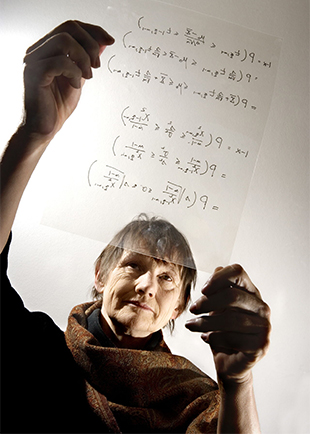Obituary for Inge Henningsen
Emeritus associate professor Inge Henningsen, who died on 5 August 2024 at the age of 83, played a central role in the statistics group at the department and at the former Department of Mathematical Statistics for many years.
Inge became a member of the Department of Mathematical Statistics in 1966 and was promoted to associate professor in 1974. At the traditional morning coffee of the statistics group, she was a natural focal point. She contributed in her friendly and humorous way with sharp analyses and insightful and thought-provoking perspectives on everything from current politics to the ontological proof of the existence of God. She frequently criticized examples of incorrect use of statistics and probability that she had come across - often in one of the day's newspapers.
It was always both enriching and entertaining to talk to Inge. Everyone benefited from her care and almost boundless generosity. Every year she invited all statistics students and the employees in the statistics group to dinner at her home on Kongensvej in Frederiksberg. The students took over her kitchen and cooked the food, and later they often continued to party long after Inge had gone to bed. It also happened that she did not arrive at the party until late in the evening due to other commitments. In connection with the Nordic statistics meetings, she arranged for a large group of students and staff to cycle - at least part of the way - to the meetings, where they lived in a tent camp. If a colleague for one reason or another lacked a place to hold a birthday party or a dinner after a doctoral defence, Inge on several occasions held the party on Kongensvej.

Applied and political statistics
When the University Act of 1970 was implemented, Inge had a visionary and effective partnership with Professor Hans Brøns to develop the management structure and culture at the Department of Mathematical Statistics. Also more broadly at the University of Copenhagen, Inge played a prominent role, i.a. as a member of Konsistorium in the years 1984 - 1992.
Inge's first scientific paper was published in one of the leading journals of probability theory with Patrick Billingsley, who was a professor at the University of Chicago, as a co-author. During a research stay in Chicago in 1969-70, she was strongly influenced by both the violent Vietnam demonstrations of the time and the flourishing new women's movement. This caused the focus of her research to shift from mathematical statistics to more applied and political statistics. She continued to write papers on mathematical statistics, but the main emphasis shifted more and more to articles on gender research and later educational research, areas in which she participated in several research projects.
Consistent themes in her research were educational choices of women and vulnerable groups and women's conditions and positions at universities and in research in general. She was a member of the Ministry of Research's committee "Equality in Research". In 1998, the committee proposed measures to strengthen the situation of women at the universities, including the establishment of 40 special professorships for women. However, this did not happen, as there was no majority for it in the parliament.
Inge emphasized good and clear communication, both at the university and in her outreach activities. For many years, she taught the introductory statistics course for students in the mathematical sciences, which she frequently spiced up with instructive current examples of the use - and not least the abuse - of statistical methods.
For many years, Inge played a prominent role on the left wing in Denmark. During her studies, she was active in student politics, and from its establishment in 1967, she became a member of the party Venstresocialisterne, where she was a member of the board and a parliamentary candidate - although without being elected. Before her research stay in Chicago, she was editor of the journal Politisk Revy, and in the years 1980 -1991, she edited the journal Naturkampen, which had a critical focus on science and technology. She was an active and sharp debater, who often used her statistical expertise and not least her ability to understandably and critically convey statistical results to a less numerate audience. Based on thorough statistical analyses, Inge challenged familiar notions and brought new perspectives and understandings into play.
Michael Sørensen
